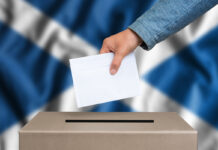Screens between seating areas and no background music among possible ‘mitigations’

ALL customers to be seated with screens between seating areas, staff wearing face coverings and no background music could be among the measures bars and restaurants will have to implement in order to operate with one metre social distancing when they open.
First minister Nicola Sturgeon today (July 2) announced that while the general advice for physical distancing will remain two metres, there will be exemptions for certain sectors – including hospitality venues, which are expected to be able to open indoor spaces from July 15 – to operate with a one metre rule in place, providing a number of “agreed mitigations” are in place. However, she stressed that outdoor areas and beer gardens, which will be able to open from Monday (July 6), “must initially comply with the two-metre rule”.
The Scottish Government has published a list of examples of such mitigations for the one-metre rule, which includes no standing – all customers seated; face coverings worn by staff; clear systems for safe ordering and payments; clear systems for safe use of toilet facilities; use of screens between seating areas; good ventilation; good signage; reduced noise measures eg. no background music, to reduce need for customers to shout; and clear messaging on need to provide contact details to support Test & Protect. Sturgeon said the government will work with industry to “agree the mitigations that will be required and finalise the detailed guidance” ahead of July 15.
The announcement that social distancing measures can be reduced if additional practices are introduced by businesses was welcomed by the Scottish Licensed Trade Association (SLTA).
“While we acknowledge that outdoor areas will need to maintain two metre social distancing for the present, this news will further help the rebuilding of the industry and gives Scotland’s pubs and bars the lifeline they need for their survival,” said SLTA managing director Colin Wilkinson.
“Without this reduction it is estimated that two thirds of our pubs and bars would not have been able to open and operate viably, leading to a large number of business closures and mass job losses. This announcement, however, does not help an estimated one third of premises which will still be wondering when they can reopen.
“Of course, the devil will be in the detail as to what extra procedures and practices will need to be adopted and the sector eagerly awaits government guidance on this.”
Willie Macleod, UK Hospitality’s executive director for Scotland, said further clarification on the reopening of hospitality businesses is “another welcome step forward”.
“Particularly positive is the confirmation that the Scottish Government will allow a reduction in the minimum social distancing requirement, with agreed mitigations,” he said.
“The next step for us is to work with the Scottish Government to ensure that any requirements are proportionate and workable for hospitality.
“Finding a practicable set of solutions to enable businesses to trade as much as possible, while staying safe, and ensuring that customers feel confident, will be a priority and will be key to a successful reopening for our sector.”
Marc Crothall, chief executive of the Scottish Tourism Alliance (STA), also welcomed the announcement on social distancing, saying its research had shown the majority of tourism businesses would be economically unsustainable under the two metre rule.
“The first minister’s announcement of the relaxation of the two metre physical distancing rule to one metre for certain sectors with mitigations is the news that the industry has been eagerly anticipating,” he said.
“Today’s news will mean that many hundreds of businesses that had not planned to reopen may now reconsider and plan to do so.
“While this decision will be welcomed by many operators in Scotland’s tourism industry, all those who I have personally spoken with remain very mindful of the absolute need to provide reassurance to their staff, customers and importantly those in the communities where their business is based. They are all committed to adopting at very least the recommended government and public health sector guidance, and in turn carry out COVID-19 risk assessments to check they have all the required processes and protocols in place.”























